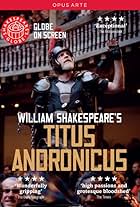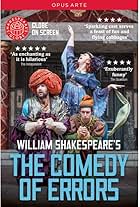Recherche détaillée
- TITRES
- NOMS
- COLLABORATIONS
Filtres de recherche
Saisir la date complète
à
ou saisir simplement aaaa ou aaaa-mm ci-dessous
à
à
à
Exclure
Inclut uniquement les titres avec les sujets sélectionnés
à
En quelques minutes
à
1-16 sur 16
- Prospero, Duke of Milan, usurped and exiled by his own brother, holds sway over an enchanted island. He is comforted by his daughter Miranda and served by his spirit Ariel and his deformed slave Caliban. When Prospero raises a storm to wreck this perfidious brother and his confederates on the island, his long contemplated revenge at last seems within reach.
- A coming of age story of a boy and girl growing up in London in the noughties, dealing with the everyday insecurities that make your world implode at sixteen.
- Grotesquely violent and daringly experimental, Titus was the smash hit of Shakespeare's early career, and is written with a ghoulish energy he was never to repeat elsewhere.
- Summer 1914. In order to dedicate themselves to a life of study, the King and his friends take an oath to avoid the company of women for three years. No sooner have they made their idealistic pledge than the Princess of France and her ladies-in-waiting arrive, presenting the men with a severe test of their high-minded resolve.
- Shakespeare's masterpiece of the turbulence of war and the arts of peace tells the romantic story of Henry's campaign to recapture the English possessions in France. But the ambitions of this charismatic king are challenged by a host of vivid characters caught up in the real horrors of war.
- This film is very much a docudrama which portrays the difficulties of Italian life circa 1963 due to the absence of a divorce law. Five scenarios with different actors portray realistic situations where divorce is clearly warranted but, because marriage was strictly in the purview of the Catholic Church at that time, which strictly forbade divorce, these people are shown to suffer the consequences in their daily lives. Italy got its first civilian divorce law in 1970.
- Basing his plot on a farce by Plautus, Shakespeare caps the mayhem of his Roman original to build up a hectic tale of violent cross-purposes, furious slapstick and social nightmare.
- Autumn 1918. A group of soldiers return from the trenches. The world-weary Benedick and his friend Claudio find themselves reacquainted with Beatrice and Hero. As memories of conflict give way to a life of parties and masked balls, Claudio and Hero fall madly, deeply in love, while Benedick and Beatrice reignite their own altogether more combative courtship. Set amidst the brittle high spirits of a post-war house party, where youthful passions run riot, lovers are deceived and happiness is threatened - before peace ultimately wins out.
- '...if we meet we shall no 'scape a brawl, For now, these hot days, is the mad blood stirring.' Act 3 scene 1 of the timeless classic is re-imagined for the screen, but this time with a bit of a twist. A short, action-packed thriller 'where civil blood makes civil hands unclean.' It's the brawl between two households like you've never seen it before. Lost Light Productions presents: III.1 - Romeo's Turn Adapted from William Shakespeare's 'Romeo & Juliet' - Act 3.1 Directed by Andrew Mayer.
- 1978–19852h 48mTV-14Épisode télévisé6,6 (472)Two teenagers fall in love, but their feuding families and fate itself cause the relationship to end in tragedy.
- On board a ship carrying King Alonso of Naples and his entourage, a boatswain directs the crew to fight a great storm, but the ship appears destined to sink. Prospero, the former duke of Milan, who has been stranded on a barren island for 12 years with his daughter, Miranda, explains to her that he used his magic to raise the storm and that he ensured that no one on the ship was harmed. He then tells her how, 12 years before, his brother Antonio conspired with Alonso, king of Naples, to usurp Prospero's dukedom and put him and Miranda to sea, where they happened upon the barren island that is now their home. Having charmed Miranda asleep, Prospero summons the spirit Ariel, hears Ariel's report of the tempest, and gives her further orders. Prospero wakes Miranda, and they visit Caliban, whom Prospero threatens with torture if he will not continue his labors. Ariel, invisible, entices Ferdinand, son and heir to Alonso, into the presence of Prospero and Miranda. Prospero, delighted that Ferdinand and Miranda fall instantly in love, puts false obstacles in their way by accusing Ferdinand of treason and by using charms to enslave him.
- Prospero releases Alonso and the court party from their charmed state and renounces the further use of his magic. Alonso restores Prospero to the dukedom of Milan, and, in return, Prospero reunites him with Ferdinand. Ariel arrives with the ship's master and boatswain, and all are soon joined by Caliban, Stephano, and Trinculo, whom Prospero sends off to decorate his cell. As they prepare to set sail for Naples, Prospero gives Ariel her freedom.
- Prospero releases Ferdinand and gives him Miranda as his bride-to-be. To celebrate the prospect of their union, Prospero instructs Ariel to have the spirits under Prospero's control perform a masque. During the masque, Prospero remembers the threat posed by Caliban and stops the masque. He joins Ariel in driving off Caliban, Stephano, and Trinculo with spirits in the guise of dogs.
- Ferdinand is visited by Miranda. Prospero observes them unseen as they exchange marriage vows and clasp hands. Trinculo and Caliban quarrel, and Stephano takes Caliban's part. Ariel, invisible, imitates Trinculo's voice and accuses Caliban of lying, causing further trouble among the three. Caliban calls Prospero a tyrant and urges Stephano to kill Prospero and take Miranda as his consort. Stephano and Trinculo join Caliban in following the music that Ariel plays to lead them out of their way. King Alonso and his party, weary with searching, are visited by "strange shapes" bringing in a banquet, while Prospero, unseen, observes them. But when Alonso and his party take up the shapes' invitation to eat and drink, Ariel appears as a Harpy and makes the food and drink vanish. The Harpy accuses Alonso, Sebastian, and Antonio of usurping Prospero's dukedom and threatens them with worse than death. The three "men of sin" leave in a desperate state.
- King Alonso and his entourage wander the island in search of Ferdinand. Gonzalo tries unsuccessfully to encourage hope in Alonso of Ferdinand's survival. Then Ariel, invisible, charms asleep all but Antonio and Sebastian. Antonio seizes the occasion to persuade Sebastian to kill King Alonso and Gonzalo and take the throne of Naples. Ariel, invisible, returns to awake Gonzalo, who wakes the rest. They resume their search. Having escaped the apparently sinking ship, Trinculo finds Caliban hiding under a cloak, under which Trinculo also crawls to take shelter from the storm. Stephano, drunk, finds them both and shares his bottle with them. In return, Caliban abandons Prospero's service and swears to be Stephano's subject.
- Sonnet 14 varies the procreation theme, tying it in with predictions of the future made, not through tracking the stars in the heavens as would normally be expected, but through taking the youth's eyes as stars which foretell the future. Shakespeare implies here that the foreknowledge he has from the 'stars' of the youth's eyes surpasses that derived from traditional astrology. The comparison of stars with eyes is traditional love lore in which the beloved assumes the qualities of everything that is angelic and heavenly. From the subject's eyes, Will predicts that the young man's death is in fact the death of Beauty itself. He asserts that truth and beauty will be doomed forever unless the young man chooses to perpetuate his line by having children.











